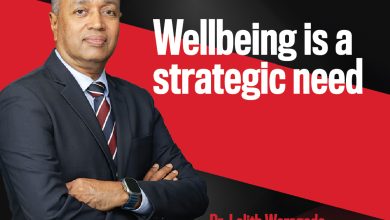HR AND PEOPLE MANAGEMENT
The new currency
Kshanika Ratnayaka
It’s no secret that employee perceptions about work and expectations of employers have shifted due to the global pandemic. Although the pandemic may now be in the rear view mirror, this shift of perception will require organisations to reconsider their people management policies.
To fulfill this challenging task, human resource (HR) management must be a partner in driving organisational culture.
Employees who perceive credibility, trust, respect, fairness, pride and camaraderie in their employers will likely be happier, and stay longer. These qualities are vital for building a committed work culture in any organisation. Employees should feel respected by management, experience professional support, collaboration and involvement in decision making, and be shown empathy.
Integrating impartial human resource policies and practices into the workplace environment will help employees take pride in their work, in the achievements of their colleagues and eventually in the organisation, leading to a strong sense of community and oneness.
Kshanika Ratnayaka believes that relationships are essential to building a great team and managing people well: “HR teams in successful organisations are keenly attuned to employee career progression; they solicit employee feedback, and engage in reward and recognition reviews regularly.”
She adds: “A good people manager builds one-on-one relationships, and uses empathy and fairness in dealing with employees. Making connections with employees inspires tangible contributions and helps realise potential.”
Ratnayaka says the top three factors that are most important for handling employees are empathy, the ability to listen and to treat people as people – not robots. This is a global reality and not limited only to certain markets.
Respondents to a 2021 Great Place to Work®-Johns Hopkins study consistently experienced significant gaps in purpose and connections – two areas needed to flourish at work. Nearly half reported not finding meaning in their work while 39 percent felt their work does not make a significant contribution.
Meanwhile, 35 percent of the respondents to the survey didn’t feel a sense of belonging and a quarter felt lonely at work. Employees are nine percent more likely to feel lonely at work if they identify with a group marginalised on the basis of their ethnic origin, race, colour, religious beliefs or place of birth, the report found.
Diversity and inclusion are becoming more critical for organisations of all sizes, not only for the top few. Fairness and equal opportunity have to be seen in practice rather than being set out in vision statements, she says.
People managers need to build three key capabilities, which are the ability to connect with, develop and inspire their team members, she affirms.
“This is a holistic approach to being an effective people manager and helps build trust with team members. The direct outcome of investing in building trust is the return of good performance, which enables the organisation to maximise its human potential. The people manager plays a pivotal role in building and sustaining a ‘high trust high performance’ culture in the workplace,” she declares.
Sharing her thoughts on new trends emerging from the post pandemic era, Ratnayaka explains that “the world of work has been disrupted by the global pandemic in a more or less permanent manner. Now that hybrid and remote work is a possibility, this trend will drive many organisations and sectors.”
“There will also be a greater emphasis on work-life balance and mental wellbeing of employees. In addition, the entry of technologies such as AI and automation, and the gig economy, will continue to create new trends,” she asserts.
So aspects such as employee experience, workplace culture, and a high trust and resilient employer-employee relationship demonstrates that ‘culture is the new currency’ for organisations intent on becoming preferred employers.






